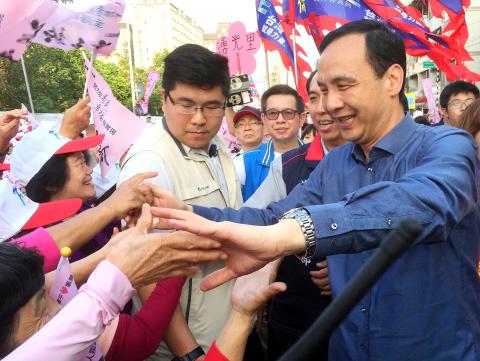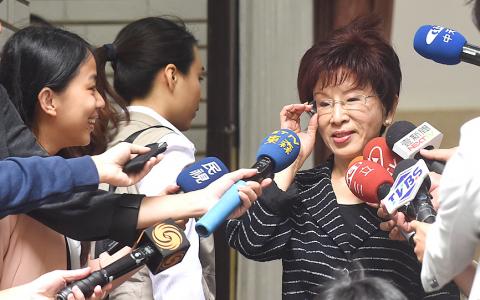Several Chinese Nationalist Party (KMT) members yesterday ridiculed the party’s list of legislator-at-large nominees, which critics described as the worst lineup in history.
Prior to a meeting of the KMT’s Central Standing Committee yesterday afternoon, committee member Yao Chiang-lin (姚江臨) told reporters that while he dared not criticize the list as the worst in history, its rankings were undeniably unfair to grassroots workers.
“The Social Democratic Party gave its labor representative the top spot on its legislator-at-large list, while the Democratic Progressive Party put its in 14th place. However, the KMT placed Taiwan Confederation of Trade Unions director-general Chuang Chueh-an (莊爵安) 19th,” Yao said.

Photo: CNA
Yao said workers and farmers were the reasons the KMT was defeated by the Chinese Communist Party in the Chinese Civil War, forcing it out of China in 1949, and why it lost the 2000 presidential election.
The KMT has not learned its lesson and still disregards grassroots workers, Yao said, adding that the list included too many unfamiliar names and too few people who have made contributions to the party.
Central Standing Committee member Hou Tsai-feng (侯彩鳳) gave the list a score of 60 percent, saying that although the KMT leadership moved Chuang from 22nd spot to 19th, he was still excluded from the “safe list.”

Photo: Liu Hsin-de, Taipei Times
“If the nominees were selected for the purpose of boosting the KMT’s election prospects in the 2018 mayoral and county commissioner elections, then why are so many of them not running for a regional seat in the legislature?” Hou said, referring to Chu’s plan to recruit candidates from the list for the local elections in 2018 after they have accumulated experience during the first two years of their four-year legislative term.
“I beg of you, higher echelons of the KMT: Please give the party a break,” Hou added.
Committee member Tseng Wen-pei (曾文培) said the KMT leadership should explain its criteria for choosing the nominees, as many of them might serve as the party’s “small Cabinet” in the legislature should it lose power next year.
“The KMT’s 211-seat Central Standing Committee is to vote on each of the nominees tomorrow [today]. No one has ever been removed from the list by the committee, but I am not so sure about that this time,” Tseng said.
According to KMT regulations, nominees who receive votes of disapproval from more than half of the committee members attending a meeting would see their nomination annulled.
The KMT’s Huang Fu-hsing (黃復興) military veterans’ branch issued a press release yesterday saying it regrets the party’s decision to place Legislative Speaker Wang Jin-pyng (王金平) at the top of the list.
“While the decision was made out of respect for the speaker and due to some political considerations, it nevertheless failed people’s expectation for fundamental reform of the legislature,” it said.
Legislative Deputy Speaker Hung Hsiu-chu (洪秀柱) gave a score of 100 when asked by reporters to grade the legislator-at-large list.
Asked if she was serious, Hung said: “Who still means what they say nowadays?”
Lee Kuang-yi (李光儀), a journalist with the Chinese-language United Daily Evening News, traditionally a pan-blue-leaning newspaper, called the list the “lamest ever in history.”
“There is nothing refreshing or new, only traces of wrangling between different KMT factions and pork-barrel politics. I believe no pan-blue supporter would be happy with the list,” Lee said in an editorial on Thursday.

Right-wing political scientist Laura Fernandez on Sunday won Costa Rica’s presidential election by a landslide, after promising to crack down on rising violence linked to the cocaine trade. Fernandez’s nearest rival, economist Alvaro Ramos, conceded defeat as results showed the ruling party far exceeding the threshold of 40 percent needed to avoid a runoff. With 94 percent of polling stations counted, the political heir of outgoing Costa Rican President Rodrigo Chaves had captured 48.3 percent of the vote compared with Ramos’ 33.4 percent, the Supreme Electoral Tribunal said. As soon as the first results were announced, members of Fernandez’s Sovereign People’s Party

MORE RESPONSIBILITY: Draftees would be expected to fight alongside professional soldiers, likely requiring the transformation of some training brigades into combat units The armed forces are to start incorporating new conscripts into combined arms brigades this year to enhance combat readiness, the Executive Yuan’s latest policy report said. The new policy would affect Taiwanese men entering the military for their compulsory service, which was extended to one year under reforms by then-president Tsai Ing-wen (蔡英文) in 2022. The conscripts would be trained to operate machine guns, uncrewed aerial vehicles, anti-tank guided missile launchers and Stinger air defense systems, the report said, adding that the basic training would be lengthened to eight weeks. After basic training, conscripts would be sorted into infantry battalions that would take

GROWING AMBITIONS: The scale and tempo of the operations show that the Strait has become the core theater for China to expand its security interests, the report said Chinese military aircraft incursions around Taiwan have surged nearly 15-fold over the past five years, according to a report released yesterday by the Democratic Progressive Party’s (DPP) Department of China Affairs. Sorties in the Taiwan Strait were previously irregular, totaling 380 in 2020, but have since evolved into routine operations, the report showed. “This demonstrates that the Taiwan Strait has become both the starting point and testing ground for Beijing’s expansionist ambitions,” it said. Driven by military expansionism, China is systematically pursuing actions aimed at altering the regional “status quo,” the department said, adding that Taiwan represents the most critical link in China’s

‘REALLY PROUD’: Nvidia would not be possible without Taiwan, Huang said, adding that TSMC would be increasing its capacity by 100 percent Nvidia Corp CEO Jensen Huang (黃仁勳) on Saturday praised and lightly cajoled his major Taiwanese suppliers to produce more to help power strong demand for artificial intelligence (AI), capping a visit to the country of his birth, where he has been mobbed by adoring fans at every step. Speaking at an impromptu press conference in the rain outside a Taipei restaurant, where he had hosted suppliers for a “trillion-dollar dinner,” named after the market capitalization of those firms attending, Huang said this would be another good year for business. “TSMC needs to work very hard this year because I need a lot